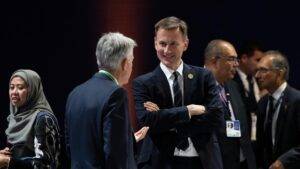Jeremy Hunt rules out tax cuts and warns things are going to get worse


Tens of billions of pounds of higher debt interest payments and a slowing economy mean that the UK’s fiscal picture is far worse than it was in the spring, the chancellor has warned before his autumn statement.
Jeremy Hunt said that the economic outlook accompanying his autumn statement on November 22 was likely to show between £20 billion and £30 billion in additional debt interest payments due to high borrowing costs, compared with forecasts from the Office for Budget Responsibility (OBR) in March. He said that the growth outlook had also worsened, ruling out the possibility of tax cuts this autumn.
“The international situation calls for prudence in the way we manage our finances,” Hunt told reporters on the sidelines of the annual meetings of the International Monetary Fund in Marrakesh. “The financial picture I face is worse than in the spring and that means I will have to take different positions to make sure, in the face of what’s happening in Ukraine, Israel and parts of Africa, that we are resilient.”
In his last budget in March Hunt only just met his self-imposed fiscal rule to get the debt ratio falling within five years by £6.5 billion. This so-called headroom is likely to have been eroded by the high interest rate environment, where the base rate has been lifted to 5.25 per cent by the Bank of England. Higher borrowing costs mean that the Treasury has to pay more when issuing bonds on the financial markets, and high inflation raises the debt servicing costs on bonds that are linked to the Retail Price Index measure of inflation.
The OBR has been consistently more optimistic about the UK’s future growth prospects that forecasters such as the Bank of England and the International Monetary Fund (IMF). A potential downgrade from the independent watchdog would mean that the economy will be smaller, limiting the government’s room for higher public spending or tax cuts before a probable general election next year.
“The main reason why things are more challenging is because the interest rates projections for all economies have gone up since [March],” Hunt said. “That’s led to a repricing of long-term debt for everyone and the UK is not immune to those changes.
“We are likely to see an increase in our debt repayments by £20 billion to £30 billion, and that’s a huge change. We need to respond to that in a way that doesn’t drive us into recession and also make sure the UK economy is resilient going forward.”
The Treasury is facing big decisions on whether it will upgrade the pensions triple lock in line with earnings growth next year and whether to recommit itself to raising benefits in line with inflation from next April. Treasury officials have suggested that the chancellor may tweak the triple lock increase by using a lower measure of weekly earnings that strips out bonuses, a move that could save the exchequer hundreds of millions of pounds.
The IMF released its latest forecasts on the UK economy this week, showing that Britain will be the worst-performing among the world’s big economies. Growth for 2024 was downgraded to 0.6 per cent, worse than Germany, Russia and the US.
Hunt said that the IMF had been “more wrong than right” in its outlook for the UK, noting that it had not taken account of a substantial upgrade to the UK’s economic performance for 2020-21 made by the Office for National Statistics last month.
Amid criticism that the government’s debt target is hindering longer-term growth, Hunt said the fiscal rule would not be changed at the autumn statement. “There need to be guardrails on the decisions I take on tax and spending. It is important for the [financial] markets to see and understand that there is a plan for the debt,” he said.
Read more:
Jeremy Hunt rules out tax cuts and warns things are going to get worse
